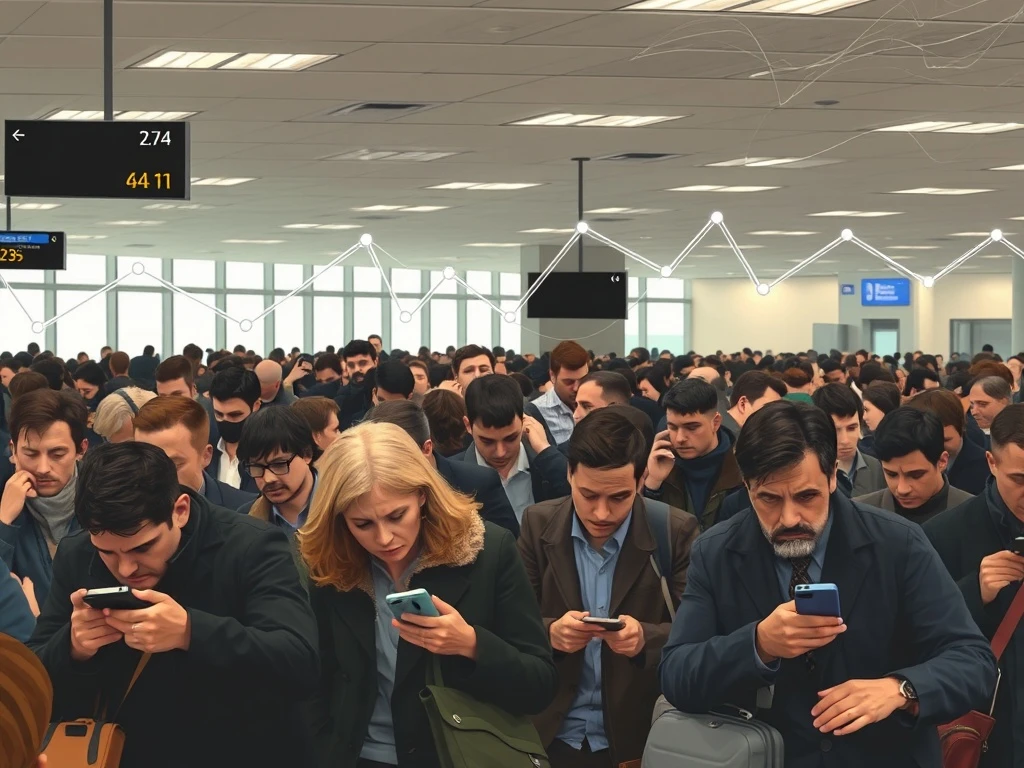Delta’s Desperate Measures: Reclaiming Exclusivity Amid Premium Travel Chaos

In an era where digital assets and tokenized experiences are redefining value, traditional markers of luxury are facing unprecedented challenges. Imagine a world where scarcity isn’t just about limited physical space, but also about the perceived value of an exclusive experience. This tension is vividly playing out at Delta Air Lines, where the struggle to manage Delta lounge access has become a microcosm of a larger societal shift. As a cryptocurrency news editor, we often analyze how digital scarcity and decentralized networks can manage access and value. Delta’s dilemma offers a fascinating real-world parallel to the challenges of managing digital exclusivity and loyalty in a rapidly democratizing world.
Delta Lounge Access: The Premium Puzzle Unraveled
Delta Air Lines, a titan in the premium travel sector, finds itself at a curious crossroads in 2025. Despite robust financial performance, including strong second-quarter earnings, a persistent shadow looms: the pervasive issue of overcrowded Delta Sky Clubs. These lounges, once bastions of tranquility and exclusivity for elite travelers, are now scenes of frustration, long lines, and diminished experiences. CEO Ed Bastian candidly admits the airline is “struggling with its own success,” a direct consequence of the post-pandemic “revenge travel” boom and an unforeseen surge in demand from the upper middle class. This has led to a re-evaluation of how Delta lounge access is granted and perceived.
The root of the problem lies in what can be termed the “democratization of luxury.” Delta’s highly successful SkyMiles loyalty program, coupled with strategic partnerships with premium credit cards, particularly American Express, has dramatically expanded the pool of eligible lounge users. With over 10 million SkyMiles members and an increasing number of credit card tiers offering lounge benefits, the physical infrastructure of Sky Clubs simply hasn’t kept pace. Social media platforms are awash with complaints, painting a clear picture: the once-elite lounge has morphed into a crowded common space, losing its allure.
Key factors contributing to the crowding include:
- SkyMiles Program Success: Unprecedented engagement in Delta’s loyalty program has broadened the base of members with lounge privileges.
- Premium Credit Card Partnerships: Cards like American Express Platinum and Delta Reserve have made lounge access widely attainable for a significant segment of the population.
- Post-Pandemic Travel Surge: The “revenge travel” phenomenon led to an unanticipated spike in demand for premium experiences.
- Infrastructure Lag: Lounge expansion and renovation efforts have been outpaced by the rapid increase in eligible users.
Navigating the Surge in Premium Travel Demand
The explosion in premium travel demand isn’t just a Delta phenomenon; it’s a reflection of a broader societal trend. More individuals than ever before have the disposable income and credit card perks that grant them entry into what were once exclusive circles. This surge, while a boon for airline revenues, creates a unique challenge: how do you maintain a premium experience when the “premium” is no longer scarce? Delta’s initial attempts to mitigate the issue, such as restricting access for Basic Economy passengers and capping visits for credit cardholders, were met with significant backlash. Customers, having invested in status and perks, felt their privileges were being eroded.
Delta’s strategic response to manage this overwhelming demand for premium travel has been multi-pronged:
- Access Restrictions: Beginning February 2025, annual lounge visits for Amex cardholders were capped at 15 per year, with unlimited access requiring $75,000+ in annual spending. Lounge entry was also limited to three hours before flights, and Basic Economy travelers were permanently barred.
- Infrastructure Upgrades: Concurrently, Delta is investing heavily in expanding and redesigning its lounges. This includes new Delta One locations in key hubs like Seattle and Los Angeles, offering enhanced services such as spa treatments and larger, more comfortable spaces.
These measures aim to alleviate physical congestion and restore a sense of exclusivity. Delta executives project that these combined efforts should largely resolve crowding issues by 2026. However, the underlying question remains: can physical space alone address a challenge rooted in perception and the changing nature of luxury?
The ‘Elite Overproduction’ Paradox: A Universal Challenge?
The dilemmas faced by Delta resonate with a compelling sociological theory: “elite overproduction.” Proposed by University of Connecticut professor Peter Turchin, this concept posits that modern societies often produce more individuals with elite credentials and aspirations than there are high-status roles or exclusive perks to distribute. In the context of airport lounges, this translates to an “overproduction” of “low-rank elites” – households with six-figure incomes and premium credit cards – who now dilute the exclusivity once inherent in such spaces.
Turchin argues that this oversupply creates a “zero-sum” environment. Even the affluent upper middle class can feel under-rewarded, as their significant investments in education, status symbols, and premium spending yield diminishing returns in terms of actual distinction. This phenomenon isn’t limited to travel; it manifests across various sectors, including education and employment, where credential inflation devalues traditional markers of success.
Consider the parallels in the crypto world. Early adopters of certain NFTs or token-gated communities experienced true digital exclusivity. However, as projects scaled, minting more tokens or expanding access, the perception of scarcity and elite status could diminish. The initial promise of unique digital ownership sometimes gives way to a broader, more diluted community, echoing the challenges of elite overproduction.
Redefining Digital Exclusivity: Lessons from Delta and Web3
Delta’s struggle highlights a fundamental tension: how to democratize luxury while preserving the perception of exclusivity. This is a challenge that the Web3 space is actively trying to solve through various mechanisms. Can blockchain technology and the principles of digital ownership offer insights into how brands like Delta might redefine digital exclusivity?
Imagine a future where:
- NFT-Gated Access: Instead of just credit card tiers, unique, non-transferable NFTs could represent tiers of loyalty and grant specific lounge access. These NFTs could be dynamic, evolving with a customer’s spending or flight activity, offering a verifiable and transparent form of status.
- Tokenized Loyalty: SkyMiles could be tokenized on a blockchain, allowing for more granular control over perks. Certain high-value activities (e.g., flying a specific number of first-class miles) could unlock rare, short-term access tokens for premium lounges, creating a true sense of earned scarcity.
- Verifiable Status: Blockchain could provide an immutable record of a traveler’s loyalty status, making it easier to verify eligibility and prevent fraudulent access, ensuring that those who truly earn premium perks receive them.
While Delta focuses on physical upgrades and traditional access restrictions, the long-term solution might lie in leveraging digital innovations to manage and verify status in a way that feels both exclusive and fair. The malaise of the upper middle class, feeling a promise of distinction but experiencing parity, is a cultural challenge that requires more than just physical space management; it requires a re-imagining of value and access in a digitally-native world.
Decentralized Access and the Future of Loyalty Programs
The concept of decentralized access, central to many blockchain applications, offers an intriguing pathway for loyalty programs. What if Delta’s lounge access wasn’t solely controlled by a centralized database, but rather by a set of transparent, immutable rules encoded on a blockchain? This could empower customers with more verifiable ownership of their loyalty status and associated perks.
For instance, a decentralized autonomous organization (DAO) could potentially govern certain aspects of a loyalty program, allowing top-tier members to vote on future lounge benefits or access policies. This would not only enhance transparency but also foster a deeper sense of community and ownership among the most valuable customers. Such a system could also facilitate:
- Programmable Loyalty: Loyalty points or tokens could be programmed to unlock specific experiences or lounge access based on predefined conditions, creating dynamic and personalized rewards.
- Interoperability: In a truly decentralized model, loyalty tokens could potentially be used across a network of partners, expanding the utility and value of earned status beyond a single airline.
- Auditable Transparency: All transactions and access grants would be verifiable on the blockchain, building trust and ensuring fairness in the distribution of exclusive perks.
While these are futuristic concepts, Delta’s current predicament serves as a powerful case study for the need to innovate beyond traditional models. The airline’s 2026 projections for resolving crowding are optimistic, but the broader question remains: in an age of elite overproduction and increasing digital fluency, can any brand truly reclaim the magic of exclusivity without embracing the possibilities of decentralized access and digital ownership?
Delta’s efforts to balance accessibility and exclusivity underscore the complexity of serving a customer base that is both affluent and increasingly discerning. As the world continues to digitize, the lessons learned from managing physical spaces like airport lounges could provide valuable insights for building robust, exclusive, and sustainable digital communities and loyalty programs in the future.
Source: [1] [title1] [url1] [2] [title2] [url1] [3] [title3] [url1] [4] [title4] [url1] [5] [title5] [url1] [6] [title6] [url1] [7] [title7] [url1]
Frequently Asked Questions (FAQs)
Why are Delta Sky Clubs so crowded?
Delta Sky Clubs are experiencing significant crowding primarily due to a surge in premium travel demand post-pandemic, coupled with an expanded base of eligible users from the highly successful SkyMiles loyalty program and partnerships with premium credit cards like American Express. The number of eligible users has simply outpaced the existing lounge infrastructure.
What is “elite overproduction” and how does it relate to Delta’s lounge issue?
“Elite overproduction,” a theory by Peter Turchin, suggests that modern societies produce more individuals with elite credentials and aspirations than there are high-status roles or exclusive perks available. In Delta’s case, it means more people have access to “premium” experiences like lounges, diluting the exclusivity and creating a feeling of “under-reward” even among the affluent.
What measures is Delta taking to reduce lounge crowding?
Delta is implementing a two-pronged approach: access restrictions and infrastructure upgrades. Restrictions include capping annual visits for Amex cardholders, limiting entry to three hours before flights, and permanently barring Basic Economy travelers. Infrastructure upgrades involve expanding and redesigning lounges, including new Delta One locations with enhanced amenities.
Could blockchain or digital assets offer solutions for managing lounge access?
Potentially, yes. Concepts like NFT-gated access, tokenized loyalty programs, and blockchain-based verifiable status could offer new ways to manage and verify exclusivity. This could provide transparent, immutable records of loyalty tiers and potentially enable more dynamic and personalized access to premium perks, addressing the challenges of digital exclusivity and decentralized access.
Will Delta’s new policies restore the premium lounge experience?
Delta projects that its new policies and infrastructure investments will largely resolve crowding by 2026. However, critics suggest that physical upgrades alone may not fully address the deeper cultural anxiety of diminished exclusivity in an age where premium experiences are increasingly accessible. The long-term success will depend on managing customer expectations and potentially innovating beyond traditional models.










